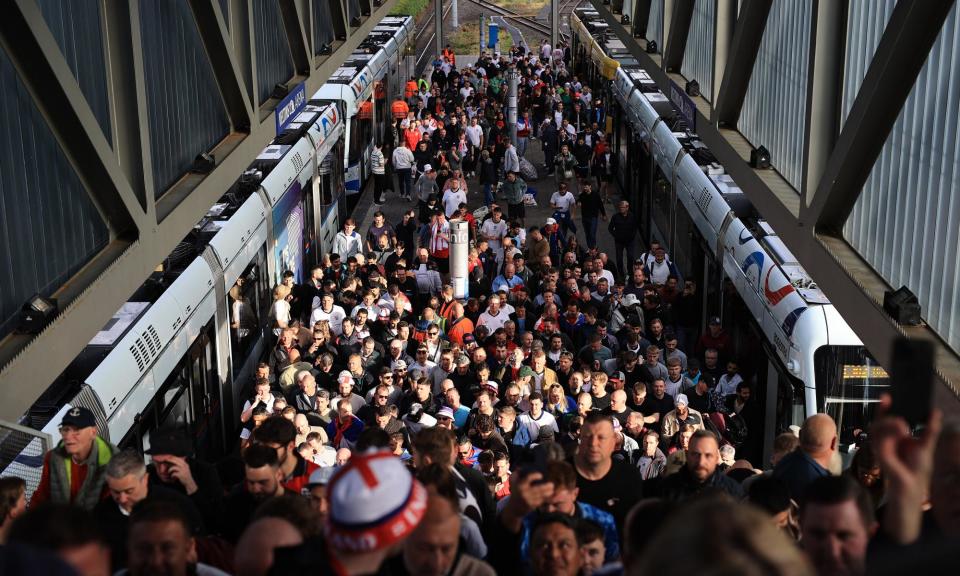Fans left sidelined and with nowhere to go thanks to Uefa’s bumbling genius

The No 107 tram pulls up next to a racecourse just outside Gelsenkirchen and judders to a halt. We wait. And wait a little more. Five minutes become 10, and then 15. Songs and idle chat gradually turn to sighs and anxious hubbub. One England fan thinks this tram might be getting diverted back to Essen. Another thinks it might be going straight to the stadium. In fact, its final destination is Gelsenkirchen railway station, where – as one of the few passengers with working phone signal confirms – the crowds are “utter carnage”.
Which is also a pretty decent description of the tableau unfolding outside the windows. Here thousands of England fans in various states of distress and confusion, some in shirts and some not, are swarming in all directions across the pasture: some staggering, some running, some trying to clamber over the metal crash barriers in an attempt to reach the tram, some succeeding and some failing comically.
Related: Jude Bellingham gives England winning start but Serbia make Southgate sweat
Oh, and it’s raining an apocalyptic storm, lending the whole scene a kind of epic dystopian quality, like a scene from Blade Runner. There are crying wet children. Grimacing wet adults. Columns of German riot police jogging down the street in formation, looking for wet Englishmen to baton, even though there is not the faintest wisp of violence. Back in the tram, 35 minutes becomes 40, and then 45.
The problem, which we only really manage to piece together in retrospect like a bad dream, is that Trabrennbahn on the edge of town is where the local authorities have decided to host a fan park. From which (too many) fans can get (not enough) shuttle buses to the Arena AufSchalke, where England are playing Serbia in – checks watch – just over an hour. Trouble is, to get from the fan park to the shuttle buses, you need to cross the tramway. Which soaking England fans are now doing in their hundreds. And so everyone is stuck.
Just one tale of logistical incontinence among many more, and – in the scale of things – a fairly tame one. Spoiler alert: I made it to the game in the end. Although only after plenty of swearing at uniformed officials and by the grace of a biblical miracle. We were milling around Gelsenkirchen a little while later, watching packed trams slide past and fiddling pointlessly with taxi apps when a bus suddenly appeared out of nowhere, opened its doors and everybody blindly poured inside. And that was that.
On the drive to the stadium we passed thousands of fans who had given up on any form of wheeled transport and decided to trudge the four miles up the dual carriageway. Some had been separated from their mates, some were shivering from the cold, some had dead phone batteries, some were carrying children. I heard from fans who sat on motionless trains for an hour, from fans who queued for two hours for a bus, from fans indefinitely squashed in dangerously overfilled trams without water or toilets or phone signal. They were still piling into the arena 20 minutes after the start, dishevelled and exhausted, having missed the only goal of the game.
And the only point to make here, really, is that there should probably be a better way of doing all this. Were this an isolated incident in an otherwise smoothly run machine, we could probably overlook it. But already there have been transport problems in most of the host cities, interminable delays on the rail network, horrific overcrowding on public transport. And of course in this regard, Uefa has already offered plenty of evidence of its own incurable inability to run a smooth showpiece event, its propensity to treat fans as a security threat, an enemy army to be defended against, rather than human beings trying to get to a football game.
Related: ‘He writes his own script’: Southgate delights in Jude Bellingham’s impact
But to the disorder of Wembley in 2021 and the disgrace of Paris in 2022 and the dysfunction of Istanbul in 2023 can be added the disarray of Germany 2024. And while the symptoms may be different, the common thread is an apparent indifference to the ordinary fan experience, a capacity to spread misery, a very late-capitalist absence of basic human dignity at virtually every stage of the process. We hear a lot about the trouble football fans cause, the potential for violence and mayhem that in reality is only ever embodied by a tiny minority. But when you consider how they are regarded and problematised by the authorities, perhaps the only surprise is that it doesn’t kick off more often.
Because pretty much without exception, the fans I have encountered at this tournament have not been thugs or criminals, or freeloaders or troublemakers. They are, quite simply, people trying to get to a place. Who have spent thousands of pounds on this trip, booked leave, made plans, left pets with the neighbours. And done so because the buzz of live tournament football is still one of the greatest narcotics in existence. It takes a certain bumbling genius to take that simple optimism, and squeeze every last drop of joy out of it.

